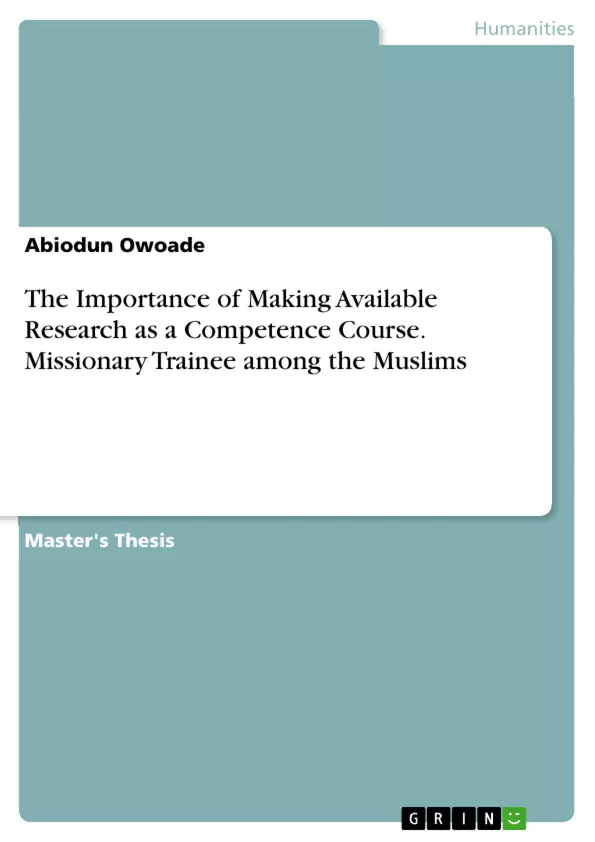The purpose of this study is to make the readers to examine and understand the importance of making available research as a competence course for missionary trainees that will be working among the unreached Muslims people group. It will share with trainees what has been known about mission research among unreached people groups in order to assist them in doing the cross-culturalmissionarywork effectively. It is not with the purpose of making them to become academic researchers who gather information that very few people can use, but to help them become researchers who can discover opportunities for preaching the gospel among the unreached; and to become researchers who can be actively involved in unreached people groups.
Culture shock and culture stress are common, but also expected and apparently not a primary direct cause of missionary attrition. But they certainly affect the quality of the missionary experience and impact the overall resilience of the missionary. And lowered resilience certainly does affect missionary attrition. One popular Nigerian adage says, "prevention is better than curing", meaning do what you need to do now, before it becomes crisis management. Proper planning will prevent poor performance; while poor preparation will present poor performance. Culture shock and culture stress and other factors of attrition for the cross-cultural missionary can be avoided with proper training. When a missionary heads into an unreached people, there are high expectations all around. But, before they even leave for this difficult endeavor, there must be an assurance that they are adequately equipped, that their zeal is equally balanced with knowledge.
The main purpose of this study is to make the readers to understand the importance of making available research as a competence course for missionary trainees that will be working among the unreached Muslims people group. This research has focused on thorough examination of the relevant literature and seek to uncover the meaning of doing research as a competence course; the ways in which research is valuable in a missionary training program; the most effective time in a missionary training program to provide a research training process and the implications of doing research among workers in Muslim communities that result in long-term effective ministry.
Inhaltsverzeichnis (Table of Contents)
- Abstract
- Chapter 1 Introduction
- Background of the Study
- Purpose of the Study
- Statement of the Research Question
- Definition of Terms
- Delimitations and Limitations
- Significance of the Study
- Chapter 2 - Review of Related Literature
- Assumption and theoretical framework
- Addressing Sub-problem 1
- Addressing Sub-problem 2
- Addressing Sub-problem 3
- Addressing Sub-problem 4
- Summary
- Chapter 3 - Methodology
- The Research Method
- Data Collection Strategies
- Data Gathering Procedure
- Development of Interview Questions
- Interview Questions and their Relation to the Sub-problem
- Data Analysis Strategies
Zielsetzung und Themenschwerpunkte (Objectives and Key Themes)
This study aims to highlight the importance of incorporating research as a competence course within missionary training programs, specifically focusing on those working among unreached Muslim people groups. The research will delve into the significance of research skills in equipping missionaries for effective cross-cultural ministry.
- The value of research training in preparing missionaries for cross-cultural ministry
- The most effective time to integrate research training into a missionary curriculum
- The implications of conducting research among Muslim communities for long-term ministry effectiveness
- The impact of cultural shock and culture stress on missionary resilience and attrition
- The role of research in mitigating cultural shock and enhancing missionary effectiveness
Zusammenfassung der Kapitel (Chapter Summaries)
Chapter 1 introduces the study's background, purpose, research question, and significance. It also defines key terms and outlines the study's delimitations and limitations. Chapter 2 delves into the relevant literature, examining existing research on intercultural competence, cross-cultural ministry, and the role of research in missionary training. It addresses specific sub-problems related to the study's objectives, drawing upon established theories and frameworks. Chapter 3 focuses on the research methodology, including the data collection strategies, data gathering procedures, and data analysis techniques.
Schlüsselwörter (Keywords)
The key themes and concepts explored in this research include: competence, competent missionary, intercultural competence, cross-cultural, intercultural, multicultural, research, research methodology, qualitative research, cross-cultural worker, people group, unreached people group, missionary, cultural shock, and decision making.
Frequently Asked Questions
Why is research important for missionary trainees?
Research helps trainees discover opportunities for preaching the gospel and equips them with knowledge to navigate unreached people groups effectively.
What is the impact of culture shock on missionaries?
Culture shock and stress can lower a missionary's resilience, which is a significant factor in missionary attrition (leaving the field).
How can research training mitigate culture stress?
By understanding the culture before arrival, missionaries can prevent "poor performance" and handle cultural differences with knowledge rather than just zeal.
When is the best time to provide research training?
The study explores the most effective phase in a training program to integrate research skills to ensure long-term ministry effectiveness.
What is intercultural competence in missions?
It is the ability to communicate and work effectively across cultures, which is a vital skill for those serving in diverse Muslim communities.
- Citar trabajo
- Abiodun Owoade (Autor), 2021, The Importance of Making Available Research as a Competence Course. Missionary Trainee among the Muslims, Múnich, GRIN Verlag, https://www.grin.com/document/1351856



